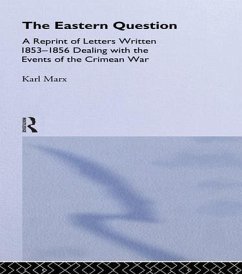Karl Marx
The Eastern Question
Karl Marx
The Eastern Question
- Broschiertes Buch
- Merkliste
- Auf die Merkliste
- Bewerten Bewerten
- Teilen
- Produkt teilen
- Produkterinnerung
- Produkterinnerung
First Published in 1994. This volume is a reprint of certain letters and articles by Karl Marx, dealing with the Eastern Question as it presented itself in the fifties, with the particular events that led up to the Crimean War, and with the War itself. This title includes certain military articles bearing very directly on the war, primarily written by Engels, or grew out of letters from him to Marx. Routledge is an imprint of Taylor & Francis, an informa company.
Andere Kunden interessierten sich auch für
![The Eastern Question The Eastern Question]() Karl MarxThe Eastern Question214,99 €
Karl MarxThe Eastern Question214,99 €![Socioeconomic Inequality in Central and Eastern Europe Socioeconomic Inequality in Central and Eastern Europe]() Socioeconomic Inequality in Central and Eastern Europe177,99 €
Socioeconomic Inequality in Central and Eastern Europe177,99 €![The Socioeconomic Impact of COVID-19 on Eastern European Countries The Socioeconomic Impact of COVID-19 on Eastern European Countries]() The Socioeconomic Impact of COVID-19 on Eastern European Countries178,99 €
The Socioeconomic Impact of COVID-19 on Eastern European Countries178,99 €![The Coal Question (Routledge Revivals) The Coal Question (Routledge Revivals)]() Ben FineThe Coal Question (Routledge Revivals)52,99 €
Ben FineThe Coal Question (Routledge Revivals)52,99 €![Atlas of Nepal in the Modern World Atlas of Nepal in the Modern World]() Michael SillAtlas of Nepal in the Modern World40,99 €
Michael SillAtlas of Nepal in the Modern World40,99 €![Middle Eastern Economic Relations with the Soviet Union, Eastern Europe, and Mainland China. Middle Eastern Economic Relations with the Soviet Union, Eastern Europe, and Mainland China.]() Robert Loring AllenMiddle Eastern Economic Relations with the Soviet Union, Eastern Europe, and Mainland China.69,99 €
Robert Loring AllenMiddle Eastern Economic Relations with the Soviet Union, Eastern Europe, and Mainland China.69,99 €![Green Innovation in Central and Eastern Europe Green Innovation in Central and Eastern Europe]() Iryna BashynskaGreen Innovation in Central and Eastern Europe169,99 €
Iryna BashynskaGreen Innovation in Central and Eastern Europe169,99 €-
-
-
First Published in 1994. This volume is a reprint of certain letters and articles by Karl Marx, dealing with the Eastern Question as it presented itself in the fifties, with the particular events that led up to the Crimean War, and with the War itself. This title includes certain military articles bearing very directly on the war, primarily written by Engels, or grew out of letters from him to Marx. Routledge is an imprint of Taylor & Francis, an informa company.
Produktdetails
- Produktdetails
- Verlag: Routledge
- Seitenzahl: 678
- Erscheinungstermin: 26. Mai 2016
- Englisch
- Abmessung: 216mm x 140mm x 36mm
- Gewicht: 839g
- ISBN-13: 9781138993228
- ISBN-10: 1138993220
- Artikelnr.: 49782488
- Herstellerkennzeichnung
- Libri GmbH
- Europaallee 1
- 36244 Bad Hersfeld
- gpsr@libri.de
- Verlag: Routledge
- Seitenzahl: 678
- Erscheinungstermin: 26. Mai 2016
- Englisch
- Abmessung: 216mm x 140mm x 36mm
- Gewicht: 839g
- ISBN-13: 9781138993228
- ISBN-10: 1138993220
- Artikelnr.: 49782488
- Herstellerkennzeichnung
- Libri GmbH
- Europaallee 1
- 36244 Bad Hersfeld
- gpsr@libri.de
Karl Marx (1818-1883) Karl Marx was a German philosopher, revolutionary, historian, sociologist, economist, and political theorist. Perhaps the most zealous intellectual advocate of communism, Marx was a proponent of ideas that were considered too radical for the time he lived in. Due to his political works, he was exiled from Germany and rendered stateless. Thereafter, he moved to London with his family, and continued to collaborate with Engels on path-breaking works, such as The Communist Manifesto and Das Kapital. Marx advocated for the socialist mode of production, as opposed to the capitalist mode, where the means of production is controlled by the ruling class. He believed that the working class could topple the capitalist system through a proletariat revolution that would establish a classless, communist society. While Marx's ideologies have been both appreciated and criticized, there is no doubt that his works and ideas have heavily influenced subsequent economic and political thought and history. Friedrich Engels (1820-1895) Friedrich Engels was a German philosopher, revolutionary, socialist, historian, political theorist, activist, as well as economist. Along with Karl Marx, he developed the principles of what is now known as Marxism. He was a staunch critic of the capitalist society, and instead saw a space for a just and equal society in socialism. His works are a critical commentary on social structures, such as religion, and systems of governance, which thrive as a result of the oppression of marginalized sections in society. In The Condition of Working Class in England, Engels studies the condition of the working class that worsened due to the Industrial Revolution (1760-1840). The work deeply influenced British historians of the time. Although he co-authored several texts with Marx, he edited and compiled Marx's unfinished works as well, while also continuing to publish his own.
Turkey
the London Press - policy of Napoleon on the Turkish question
the real issue in Turkey
the Turkish question
Turkey and Russia
the ultimatum and after
the English and French fleets - The Times - Russian aggrandizement
the Russian humbug
Brunnow and Clarendon - Armenian proclamation
Aberdeen, Clarenden, Brunnow - connivance of the Aberdeen ministry with Russia
Russian policy against Turkey
Austria and Russia
Layard-Gladstone-Aberdeen-Palmerston
the Russo-Turkish difficulty -ducking and dodging of the British Cabinet - Nesselrode's latest note
the Russian question - curious diplomatic correspondence
Russia and the Western powers
traditional policy of Russia
the press on Eastern affairs - notes of England and Russia
Russian movements - Denmark - United States and Europe
to withdraw or not to withdraw
Urquhart-Bem - the Turkish question in the House of Lords
the Turkish question in the Commons
affairs continental and English
the Vienna note
the Vienna note (contd)
the English ministry outwitted - panic
the war question
the Turkish manifesto
the northern powers
war
the holy war
Persia-Denmark
diplomacy again
the war on the Danube
the quadruple convention -England and the war
the Russian victory - position of England and France
private news from St. Petersburg
Russian policy
Palmerston's resignation
progress of the Turkish war
England and Russia
more documents
the European war
the war in Asia
the Czar's views - Prince Albert
Cobden and Russia
war finance
blue books - ambassadors withdrawing
Russian diplomacy - the shrines -Montenegro
Count Orloff's proposals
debates in Parliament
Kossuth - Disraeli and Hume - United States - France and England -Greece
France and England - the Greek rising - Asia
the Russian retreat
the documents on the partition of Turkey
the secret diplomatic correspondence
war declared - Mussulman and Christian
war with Russia
Russia and the German powers
Turkey and Greece -Italy
Austria and Servia - Greece and Turkey - Turkey and the Western powers
the Greek insurrection - alliance between Prussia and Austria - Russian armaments
bombardment of Odessa - Austria and Russia - the Greek insurrection - Montenegro - Manteuffel
Prussian policy
the exploits in the Baltic and Black Seas -Anglo-French system of operations
delay on the Danube
speeches -St. Arnaud
state of the Russian war
the war - debate in Parliament
the Russia failure
Russia, Austria, Turkey, Wallachia and Redcliffe
Austria
the siege of Silistria
the theatre of war - the Russian note to the German powers - Servia and Austria
the private conference at Vienna - ministerial crisis
another war debate
the Austro-Turkish treaty - more parliamentary talk
that bore of a war
the Russian retreat - Denmark
the evacuation
Servia - England, France and Constantinople
the capture of Bomarsund
the condition of Wallachia - revolution in Turkey
the fleet off at last - revolt of the Moldavians
the atta
the London Press - policy of Napoleon on the Turkish question
the real issue in Turkey
the Turkish question
Turkey and Russia
the ultimatum and after
the English and French fleets - The Times - Russian aggrandizement
the Russian humbug
Brunnow and Clarendon - Armenian proclamation
Aberdeen, Clarenden, Brunnow - connivance of the Aberdeen ministry with Russia
Russian policy against Turkey
Austria and Russia
Layard-Gladstone-Aberdeen-Palmerston
the Russo-Turkish difficulty -ducking and dodging of the British Cabinet - Nesselrode's latest note
the Russian question - curious diplomatic correspondence
Russia and the Western powers
traditional policy of Russia
the press on Eastern affairs - notes of England and Russia
Russian movements - Denmark - United States and Europe
to withdraw or not to withdraw
Urquhart-Bem - the Turkish question in the House of Lords
the Turkish question in the Commons
affairs continental and English
the Vienna note
the Vienna note (contd)
the English ministry outwitted - panic
the war question
the Turkish manifesto
the northern powers
war
the holy war
Persia-Denmark
diplomacy again
the war on the Danube
the quadruple convention -England and the war
the Russian victory - position of England and France
private news from St. Petersburg
Russian policy
Palmerston's resignation
progress of the Turkish war
England and Russia
more documents
the European war
the war in Asia
the Czar's views - Prince Albert
Cobden and Russia
war finance
blue books - ambassadors withdrawing
Russian diplomacy - the shrines -Montenegro
Count Orloff's proposals
debates in Parliament
Kossuth - Disraeli and Hume - United States - France and England -Greece
France and England - the Greek rising - Asia
the Russian retreat
the documents on the partition of Turkey
the secret diplomatic correspondence
war declared - Mussulman and Christian
war with Russia
Russia and the German powers
Turkey and Greece -Italy
Austria and Servia - Greece and Turkey - Turkey and the Western powers
the Greek insurrection - alliance between Prussia and Austria - Russian armaments
bombardment of Odessa - Austria and Russia - the Greek insurrection - Montenegro - Manteuffel
Prussian policy
the exploits in the Baltic and Black Seas -Anglo-French system of operations
delay on the Danube
speeches -St. Arnaud
state of the Russian war
the war - debate in Parliament
the Russia failure
Russia, Austria, Turkey, Wallachia and Redcliffe
Austria
the siege of Silistria
the theatre of war - the Russian note to the German powers - Servia and Austria
the private conference at Vienna - ministerial crisis
another war debate
the Austro-Turkish treaty - more parliamentary talk
that bore of a war
the Russian retreat - Denmark
the evacuation
Servia - England, France and Constantinople
the capture of Bomarsund
the condition of Wallachia - revolution in Turkey
the fleet off at last - revolt of the Moldavians
the atta
Turkey
the London Press - policy of Napoleon on the Turkish question
the real issue in Turkey
the Turkish question
Turkey and Russia
the ultimatum and after
the English and French fleets - The Times - Russian aggrandizement
the Russian humbug
Brunnow and Clarendon - Armenian proclamation
Aberdeen, Clarenden, Brunnow - connivance of the Aberdeen ministry with Russia
Russian policy against Turkey
Austria and Russia
Layard-Gladstone-Aberdeen-Palmerston
the Russo-Turkish difficulty -ducking and dodging of the British Cabinet - Nesselrode's latest note
the Russian question - curious diplomatic correspondence
Russia and the Western powers
traditional policy of Russia
the press on Eastern affairs - notes of England and Russia
Russian movements - Denmark - United States and Europe
to withdraw or not to withdraw
Urquhart-Bem - the Turkish question in the House of Lords
the Turkish question in the Commons
affairs continental and English
the Vienna note
the Vienna note (contd)
the English ministry outwitted - panic
the war question
the Turkish manifesto
the northern powers
war
the holy war
Persia-Denmark
diplomacy again
the war on the Danube
the quadruple convention -England and the war
the Russian victory - position of England and France
private news from St. Petersburg
Russian policy
Palmerston's resignation
progress of the Turkish war
England and Russia
more documents
the European war
the war in Asia
the Czar's views - Prince Albert
Cobden and Russia
war finance
blue books - ambassadors withdrawing
Russian diplomacy - the shrines -Montenegro
Count Orloff's proposals
debates in Parliament
Kossuth - Disraeli and Hume - United States - France and England -Greece
France and England - the Greek rising - Asia
the Russian retreat
the documents on the partition of Turkey
the secret diplomatic correspondence
war declared - Mussulman and Christian
war with Russia
Russia and the German powers
Turkey and Greece -Italy
Austria and Servia - Greece and Turkey - Turkey and the Western powers
the Greek insurrection - alliance between Prussia and Austria - Russian armaments
bombardment of Odessa - Austria and Russia - the Greek insurrection - Montenegro - Manteuffel
Prussian policy
the exploits in the Baltic and Black Seas -Anglo-French system of operations
delay on the Danube
speeches -St. Arnaud
state of the Russian war
the war - debate in Parliament
the Russia failure
Russia, Austria, Turkey, Wallachia and Redcliffe
Austria
the siege of Silistria
the theatre of war - the Russian note to the German powers - Servia and Austria
the private conference at Vienna - ministerial crisis
another war debate
the Austro-Turkish treaty - more parliamentary talk
that bore of a war
the Russian retreat - Denmark
the evacuation
Servia - England, France and Constantinople
the capture of Bomarsund
the condition of Wallachia - revolution in Turkey
the fleet off at last - revolt of the Moldavians
the atta
the London Press - policy of Napoleon on the Turkish question
the real issue in Turkey
the Turkish question
Turkey and Russia
the ultimatum and after
the English and French fleets - The Times - Russian aggrandizement
the Russian humbug
Brunnow and Clarendon - Armenian proclamation
Aberdeen, Clarenden, Brunnow - connivance of the Aberdeen ministry with Russia
Russian policy against Turkey
Austria and Russia
Layard-Gladstone-Aberdeen-Palmerston
the Russo-Turkish difficulty -ducking and dodging of the British Cabinet - Nesselrode's latest note
the Russian question - curious diplomatic correspondence
Russia and the Western powers
traditional policy of Russia
the press on Eastern affairs - notes of England and Russia
Russian movements - Denmark - United States and Europe
to withdraw or not to withdraw
Urquhart-Bem - the Turkish question in the House of Lords
the Turkish question in the Commons
affairs continental and English
the Vienna note
the Vienna note (contd)
the English ministry outwitted - panic
the war question
the Turkish manifesto
the northern powers
war
the holy war
Persia-Denmark
diplomacy again
the war on the Danube
the quadruple convention -England and the war
the Russian victory - position of England and France
private news from St. Petersburg
Russian policy
Palmerston's resignation
progress of the Turkish war
England and Russia
more documents
the European war
the war in Asia
the Czar's views - Prince Albert
Cobden and Russia
war finance
blue books - ambassadors withdrawing
Russian diplomacy - the shrines -Montenegro
Count Orloff's proposals
debates in Parliament
Kossuth - Disraeli and Hume - United States - France and England -Greece
France and England - the Greek rising - Asia
the Russian retreat
the documents on the partition of Turkey
the secret diplomatic correspondence
war declared - Mussulman and Christian
war with Russia
Russia and the German powers
Turkey and Greece -Italy
Austria and Servia - Greece and Turkey - Turkey and the Western powers
the Greek insurrection - alliance between Prussia and Austria - Russian armaments
bombardment of Odessa - Austria and Russia - the Greek insurrection - Montenegro - Manteuffel
Prussian policy
the exploits in the Baltic and Black Seas -Anglo-French system of operations
delay on the Danube
speeches -St. Arnaud
state of the Russian war
the war - debate in Parliament
the Russia failure
Russia, Austria, Turkey, Wallachia and Redcliffe
Austria
the siege of Silistria
the theatre of war - the Russian note to the German powers - Servia and Austria
the private conference at Vienna - ministerial crisis
another war debate
the Austro-Turkish treaty - more parliamentary talk
that bore of a war
the Russian retreat - Denmark
the evacuation
Servia - England, France and Constantinople
the capture of Bomarsund
the condition of Wallachia - revolution in Turkey
the fleet off at last - revolt of the Moldavians
the atta









